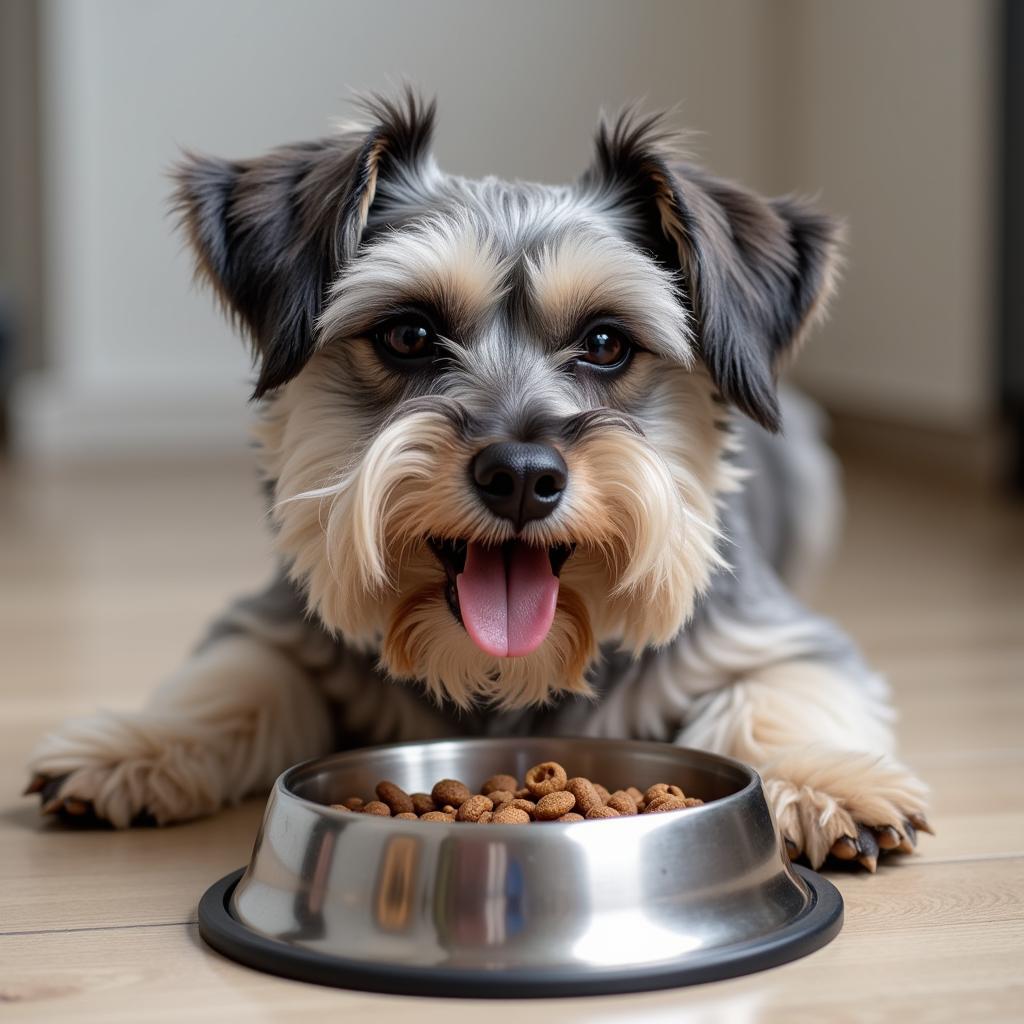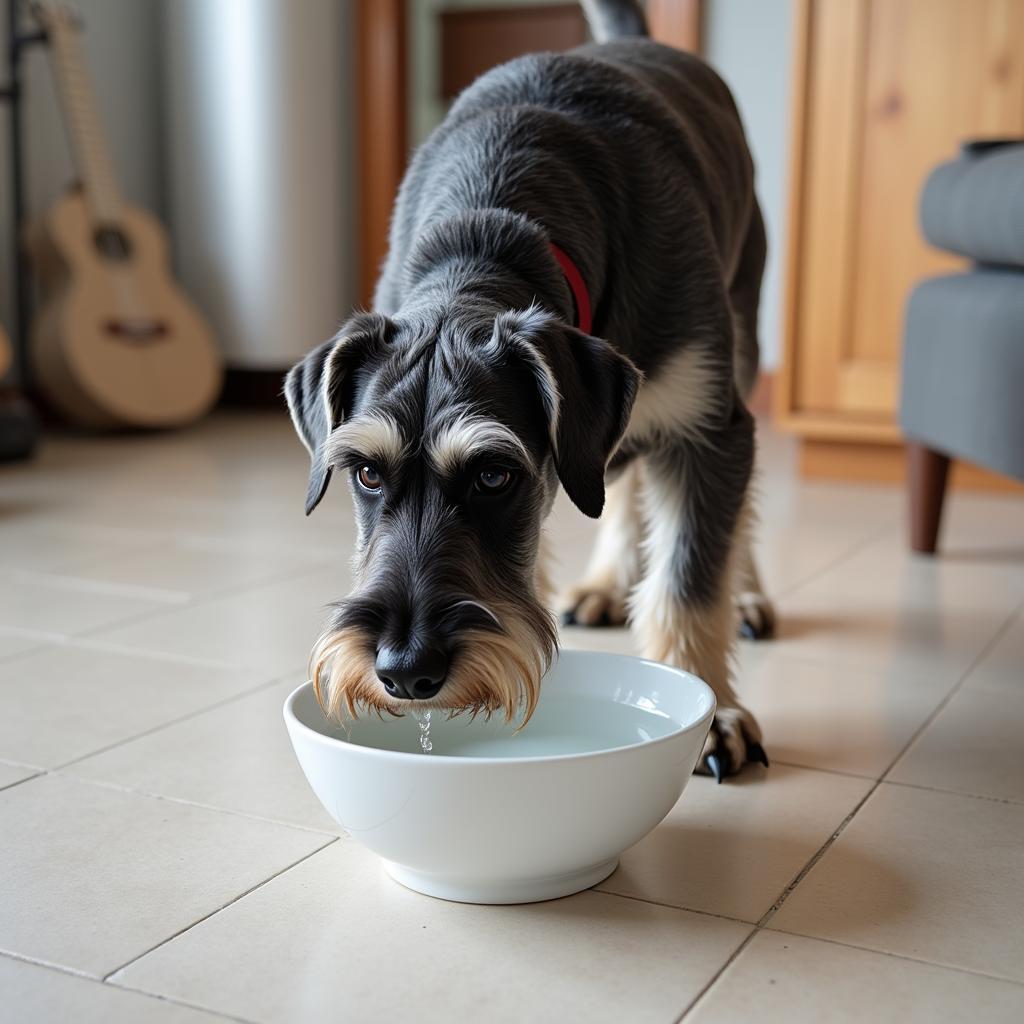Finding the best food for your Schnauzer can feel overwhelming with so many options available. Whether you have a Miniature, Standard, or Giant Schnauzer, their dietary needs are unique and crucial for their health and happiness. This guide will help you understand those needs and make informed decisions about the best food for your furry friend.
Decoding Your Schnauzer’s Dietary Needs
Schnauzers, known for their distinguished beards and spirited personalities, require a diet rich in high-quality protein, healthy fats, and complex carbohydrates. Protein helps maintain muscle mass, while fats provide energy and support healthy skin and coat. Carbohydrates offer sustained energy for their playful antics. However, not all Schnauzer food is created equal. Choosing the wrong food can lead to health problems like obesity, pancreatitis, and skin allergies. You should consider your Schnauzer’s life stage (puppy, adult, or senior) and any specific health conditions when selecting their food. For example, puppies require more calories and nutrients for growth, while senior Schnauzers may benefit from a diet lower in fat and calories. Remember, feeding your Schnauzer the right food is a key factor in ensuring a long, happy, and healthy life. Check out our guide on the best puppy food for schnauzers.
 Schnauzer enjoying a healthy meal
Schnauzer enjoying a healthy meal
Choosing the Right Type of Food: Kibble, Wet, or Raw?
The age-old question: kibble, wet, or raw? Each type of food has its pros and cons. Kibble is convenient and cost-effective, offering a complete and balanced diet in a crunchy, shelf-stable form. Wet food is often more palatable for picky eaters and can be beneficial for Schnauzers who need extra hydration. Raw diets, while gaining popularity, require careful research and preparation to ensure nutritional balance and avoid potential health risks. Always consult with your veterinarian before switching your Schnauzer to a raw diet. If you’re looking for smaller portions, our article on small dog food bowls might be helpful.
What is the Best Food for a Miniature Schnauzer?
Miniature Schnauzers, while smaller, share similar dietary requirements with their Standard and Giant counterparts. High-quality protein, healthy fats, and controlled carbohydrates are key. Due to their smaller size, they are prone to weight gain, so portion control is crucial. You can find more information on our dedicated page about the best food for mini schnauzer.
Key Ingredients to Look For (and Avoid)
When examining dog food labels, look for high-quality animal protein sources like chicken, beef, lamb, or fish as the primary ingredients. Avoid fillers like corn, wheat, and soy, which offer little nutritional value and can contribute to allergies. Beneficial additions include omega-3 fatty acids for healthy skin and coat, glucosamine and chondroitin for joint health, and probiotics for digestive support. Artificial colors, flavors, and preservatives should be avoided. For Giant Schnauzer owners, we recommend checking out our guide on the best dog food for giant schnauzer.
What About Grain-Free Diets?
Grain-free diets have become increasingly popular, but it’s essential to discuss this option with your vet. While some Schnauzers may benefit from a grain-free diet due to allergies, there is ongoing research regarding potential links between grain-free diets and heart conditions in dogs.
“A balanced diet is fundamental to a Schnauzer’s well-being,” says Dr. Emily Carter, DVM. “Always choose high-quality ingredients and consult your veterinarian before making significant dietary changes.”
Feeding Your Schnauzer: Tips and Tricks
Establish a regular feeding schedule and stick to it. This helps regulate digestion and prevents overeating. Measure portions accurately to maintain a healthy weight. Always provide fresh, clean water. And remember, treats should be given in moderation. They are a great way to reinforce training and strengthen your bond, but too many treats can contribute to obesity. You can also find helpful information on dry food options in our article on the best dry dog food for miniature schnauzer.
 Hydrated Schnauzer drinking fresh water
Hydrated Schnauzer drinking fresh water
Conclusion: Nourishing Your Schnautzer for Optimal Health
Providing the best food for your Schnauzer is a vital part of responsible pet ownership. By understanding their specific nutritional needs and choosing high-quality food, you can help them live a long, healthy, and active life. Remember to consult your veterinarian for personalized advice and to address any dietary concerns.
FAQ
- How much should I feed my Schnauzer? This depends on their age, activity level, and the specific food. Check the feeding guidelines on the food packaging and consult your vet.
- What are the signs of food allergies in Schnauzers? Common signs include itchy skin, ear infections, and digestive upset.
- Can I give my Schnauzer human food? Some human foods are safe for dogs, but others are toxic. Always research before sharing your food.
- How often should I change my Schnauzer’s food? If you’re switching foods, do it gradually over several days to avoid digestive upset.
- What are the best treats for Schnauzers? Look for treats made with natural ingredients and avoid those with artificial colors, flavors, and preservatives.
- Should I feed my Schnauzer a grain-free diet? Talk to your vet before switching to a grain-free diet.
- How can I encourage my picky Schnauzer to eat? Try warming their food or adding a small amount of low-sodium broth.
“Monitoring your Schnauzer’s weight and overall health is crucial,” advises Dr. Michael Davis, DVM, PhD. “Regular vet checkups and a balanced diet are the cornerstones of preventative care.”
Looking for more helpful articles? Check out our resources on specific Schnauzer breeds and dietary needs.
Need further assistance? Contact us at Phone Number: 02437655121, Email: minacones@gmail.com Or visit our address: 3PGH+8R9, ĐT70A, thôn Trung, Bắc Từ Liêm, Hà Nội, Việt Nam. We have a 24/7 customer service team.